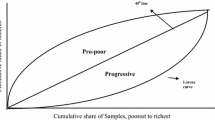Abstract
This paper attempts to measure the efficiency of provinces in the Philippines in utilizing public resources for health and education where only 1% of the total budget is spent for health and 3% is allocated for education. With such budget constraints, it is important to examine the efficiency of spending on social services as small changes can have a major impact in achieving the Millennium Development Goals. Efficiency is defined as the deviation from the frontier which represents the maximum output attainable from each input level. This efficiency frontier is estimated using the data envelopment analysis, free disposal hull and Malmquist-DEA. We use expenditures for social services for input and primary and secondary enrollment rates, literacy rate per province, and life expectancy for outputs. An analysis of efficiency scores shows that provinces where the level of inequality is higher (as measured by the Gini coefficient) as well as those who receive a larger portion of their budget as grants are among the least efficient. This research can help in the budget allocation and rationalization among Philippine provinces.
Similar content being viewed by others
References
Afonso A, St. Aubyn M (2004) Non-parametric approaches to education and health expenditure efficiency in OECD countries. Instituto Superior de Economia e Gestao Working Paper 01-2004. Instituto Superior de Economia e Gestao, Portugal, pp 1–34
Afonso A, Schuknecht L, Tanzi V (2005) Public sector efficiency: an international comparison. Public Choice 123: 321–347
Avkiran N (2001) Investigating technical and scale efficiencies of Australian Universities through data envelopment analysis. Socio Econ Plan Sci 35: 57–80
Castano MC, Cabanda E (2007) Performance evaluation of the efficiency of Philippine Private Higher Educational Institutions: application of frontier approaches. Int Trans Oper Res 14: 431–444
Celestino A (2001) Intergovernmental transfers in the Philippines: issues and practices. In: International symposium on intergovernmental transfers in Asian Countries: issues and practices. Tokyo, Japan, February 9–10, 2001
Coelli T (1996) A guide to DEAP version 2.1: A data envelopment analysis (computer) program. University of New England
Coelli T, Rao P, Battese G (1998) An introduction to efficiency and productivity analysis. Kluwer Academic Publishers, Dordrecht
Coelli T, Rao P, O’ Donnell C, Battese G (2005) An introduction to efficiency and productivity analysis, 2nd edn. Springer, New York
De Sijpe N, Rayp G (2004) Measuring and explaining government inefficiency in developing countries. Universitet Gent Working Paper 2004/266. Universitet Gent, Gent, pp 1–35
Deprins D, Simar L, Tulkens H (1984) Measuring labor-efficiency in post offices. North Holland, Amsterdam
Filmer D (2003) Determinants of health and education outcomes. Background note for World Development Report 2004. The World Bank. Mimeo
Grosskopf S (1996) Statistical inference and non-parametric efficiency: a selective survey. J Prod Anal 7: 161–176
Grosskopf S, Mourtray C (2001) Evaluating performance in Chicago public high schools in the wake of decentralization. Econ Educ Rev 20: 1–14
Gupta S, Verhoeven M (2001) The efficiency of government expenditure experiences in Africa. J Policy Model 23: 433–467
Herrera S, Pang G (2005) Efficiency of public spending in developing countries: an efficiency frontier approach. Policy Research Working Paper 3645, The World Bank, pp 1–67
Hofmarcher M, Lietz C, Schnabl C (2005) Inefficiency in Austrian inpatient care: identifying ailing providers based on DEA results. Cent Eur J Oper Res 13(4): 341–363
Hollingsworth B (2003) Non-parametric and parametric applications measuring efficiency in health care. Health Care Manage Sci 6: 203–218
IPART (1999) Efficiency and benchmarking study of the NSW distribution businesses. Sydney
Jacobs R, Smith P, Street S (2006) Measuring efficiency in health care. University Press, Cambridge
Johnes J (1996) Performance assessment in higher education in Britain. Eur J Oper Res 89: 18–33
Johnes J, Johnes G (1995) Research funding and performance in U.K. university departments of economics: a frontier analysis. Econ Educ Rev 14: 301–314
National Statistical Coordination Board (2008) Philippine National Health Accounts 2005
Ng YC, Li SK (2000) Measuring the research performance of Chinese higher education institutions: an application of data envelopment analysis. Educ Econ 8: 2–139
Ravallion M (2003) On measuring aggregate social efficiency. Policy Research Working Paper 3166, The World Bank
Rauner M, Behrens D, Wild C (2005) Quantitative decision support for health services. Cent Eur J Oper Res 13(4): 319–323
Simar L, Wilson P (2007) Estimation and inference in two-stage semi-parametric models of productive efficiency. J Econ 136: 31–64
The World Bank (2008) World Development Indicators
Zhu J (2003) Quantitative models for performance evaluation and benchmarking: DEA with spreadsheets and DEA excel solver. Springer, Boston
Author information
Authors and Affiliations
Corresponding author
Rights and permissions
About this article
Cite this article
Lavado, R.F., Cabanda, E.C. The efficiency of health and education expenditures in the Philippines. Cent Eur J Oper Res 17, 275–291 (2009). https://doi.org/10.1007/s10100-009-0095-1
Published:
Issue Date:
DOI: https://doi.org/10.1007/s10100-009-0095-1




